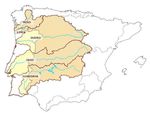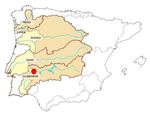SPANISH-PORTUGUESE TRANSBOUNDARY RIVERS - unece
←
→
Page content transcription
If your browser does not render page correctly, please read the page content below
SPANISH-PORTUGUESE TRANSBOUNDARY RIVERS
Spain and Portugal share five main river
basins. Three of these (Duero/Douro,
Tajo/Tejo, and Guadiana) are also some
of the largest basins in the Iberian
Peninsula.
In general, Spanish territory is upstream
and around 70% of the annual water
resources of these rivers is generated in
Spain.
Extreme variations in rainfall – from
season to season and year to year -
exacerbate scarcity in water flows,
particularly in the drier south.
Irrigation, a highly consumptive use,
is the main source of demand in
both States.ALBUFEIRA In 1998 the Spanish Government and the Portuguese Government reacted
and negotiations followed that led to the signature of a new water treaty
CONVENTION in 1998, the so-called Albufeira Convention.
ALBUFEIRA PRINCIPLES
This convention is inspired by the traditional spirit of friendship and co-operation between both Nations and
seeks to balance environmental protection with sustainable use of the water resources within the framework of
International and EU Law, whilst at the same time respects the provisions of previous water treaties.FLOW AGREEMENT IN GUADIANA RIVER AT BADAJOZ
Annual
Total volume Cumulated precipitation from
in reference 1th Octuber to 1th March
dams 1th
Precipitation Precipitation
March
higher than lower than
(hm3)
65% 65%
> 4000 600 400
3150-4000 500 300
2650-3150 400 Exeption (*)FROM ANNUAL VALUES TO TRIMESTER VALUES
1 Trimester 3 Trimester
Storage volume Pp higher than Pp lower than
in selected 65% 65% Storage volume
Pp higher than Pp lower than
dams [hm3] in selected
65% 65%
dams [hm3]
> 3700 63 42 > 3700 42 28
2850-3700 53 32 2850-3700 35 21
2350-2850 28 Exeption (*)
2350-2850 42 Exeption (*)
< 2350 Exeption (*) Exeption (*)
< 2350 Exeption (*) Exeption (*)
4 Trimester
2 Trimester
Storage volume
Storage volume Pp higher than Pp lower than
Pp higher than Pp lower than in selected
in selected 65% 65%
65% 65% dams [hm3]
dams [hm3]
> 3400 32 21
> 4000 74 49
2550-3400 26 16
3150-4000 61 37 2050-2550 21 Exeption (*)
2650-3150 49 Exeption (*) < 2050 Exeption (*) Exeption (*)
< 2650 Exeption (*) Exeption (*) (*) Exeptions witn mínimum flows:
MINIMUM FLOWS:
Qmin 2 m3/s
Min Annual Volume 63,1 hm3/year
Minimum trimester volume 15,8 hm3/trimTHE SENEGAL RIVER
With a length of 1,800 km, the
Senegal River crosses Guinea, Mali,
Mauritania and Senegal.
The river basin extends over 337,
500 km² and has a population of
around 3,500,000 inhabitants (16%
of the total populations of these
states).
A milestone in this history was the
creation in 1972 of the Organisation
pour la Mise en Valeur du Fleuve
Sénégal (OMVS) when the basin
countries were experiencing the
worst drought in decades.
The document signed by the 4
countries gives the Commission the
possibility of managing water.DELTA DETERIORATION AFFECTING LOCAL COMMUNITIES The delta and the Senegal valley were affected with the impoundment of the Manantali and Diama dams. These changes had negative impacts on the functioning of the delta ecosystems and local communities
ARTIFICIAL FLOODS: IMPROVING THE DELTA CONDITION
OF PEOPLE AND ECOSYSTEMS
OMVS initiated the
implementation of the
Environmental Impact
Mitigation and Monitoring
Program (PASIE). This
program aims to define and
implement a series of actions
that are part of a global
strategy for the protection
and preservation of the
environment.
Managed flood releases from Manantali allowed traditional recession agriculture in the floodplains to continue,
especially in the years of important natural floods. This compensatory measure attenuated the negative impacts
of the dams on the quality of life of the traditional floodplain users.
With increased understanding - within the donor community and OMVS - of the economic, social and environmental
benefits of the artificial floods, it is envisaged to the perpetuate the managed flood releases.You can also read



























































